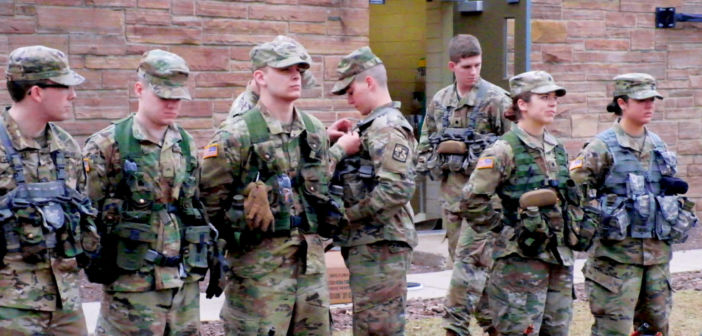Graduating ROTC students Ryan Paradise, ‘20, Jacob Matus, ‘20, Dominique Voitek, ‘20, and Palmer Ferrara, ‘20, reflect on balancing classes, physical training and maintaining relationships in and out of ROTC during their time at Lehigh. They shared insight as to how their ROTC careers at Lehigh panned out, including successes, hardships, and the effects of coronavirus on their last semester and future endeavors.
For most of the seniors interviewed, the decision to serve in the Army had been made in high school, where they applied for a National ROTC Scholarship.
Paradise said he was inspired by his parents’ participation in ROTC at the University of Notre Dame. Matus and Ferrara said they simply knew serving their country is something they wanted to do.
Voitek, the only female ROTC member in Lehigh’s class of 2020, said she had a bit of a different experience.
“My first semester at Lehigh, I was on the cheerleading team and was undeclared as a major and unsure of what I wanted my future to be,” Voitek said. “I went from being super regimented in high school, playing three sports year round, to going to the cheerleading team — which wasn’t what I wanted it to be.
She was directed toward Army ROTC after looking into enlisting during her second semester, and was offered a scholarship the summer going into her sophomore year.
During their time at Lehigh, these students involved themselves in athletics, clubs and activities outside of ROTC. Paradise is a member of the men’s cross country and track teams, and Matus and Ferrara were both involved in Greek life.
Besides working out more than the average Lehigh student and waking up earlier, Ferrara said he did not think his college experience was that different from the typical student.
“I think Lehigh ROTC allows you to experience just about every opportunity that would be afforded to a non-ROTC student, in addition to achieving high quality ROTC training,” Ferrara said. “It’s the best of both worlds. This is not necessarily the case at other ROTC programs.”
Matus said it was sometimes a struggle juggling more responsibilities than most students were, and said there were challenges with time management.
“I’d rather learn it now in college than have to figure it out in the real world,” Matus said.
In regards to social life outside of ROTC, Paradise said his experience led him to interact with many of his peers on a daily basis. As he formed relationships, he said he had to make sure he was investing in those relationships proportionately.
As an ROTC student, there is pressure to maintain a high GPA due to the weight it has in Advanced Camp. Incoming seniors attend Advanced Camp in Fort Knox, Kentucky, where students earn points based on their performance. Performance is judged on GPA, physical training test scores and leadership abilities, which ultimately decide what military branch they are given.
“The Advanced Camp is definitely one of the toughest things you do, but I think graduating from there has definitely been one of the highlights of my ROTC career,” Matus said, “Finally getting Aviation, which I’ve been trying to get for four years now, has been one of the most positive things, I’d say.”
Matus said balancing a regular course load with the responsibilities of his military science class and a social life was difficult. He said it was harder his freshman and sophomore year but, by junior and senior year, he was able to learn how to better manage his time.
Matus said the commitments of being in a fraternity tend to be more overwhelming in the first two years of college, which added to the stress.
“My class has been super close,” Matus said. “It’s almost like a second fraternity in a sense.”
Voitek reflected on her participation in the Ranger Challenge and Sandhurst Teams as “the varsity sport of ROTC.” Students try out for this physically demanding and military skill-based team. Eleven out of the 100 cadets in the program are selected for this team, which competes against 42 ROTC programs in the Northeast.
She participated on the team during her sophomore, junior and senior years. Sophomore year the team placed third, second junior year, and senior year first.
“The goal of that is to qualify for the Sandhurst International Military Skills Competition, where they take only the top 16 ROTC programs in the country out of over 300 to go to this competition at West Point,” Voitek said.
After winning first place in the fall, knowing they’d be competing at West Point, the team trained deliberately, only for the competition to be canceled due to coronavirus.
Now that the pandemic has cut their time at Lehigh short, those involved in ROTC are carrying on with their classes, training, and responsibilities remotely.
“Aside from moving our entire ROTC curriculum online, the mitigation of COVID-19 impacts on our senior class, once they achieve their bachelor’s degree is a top priority for our leadership,” said John Abella, department chair and professor of military science and leadership.
Abella said the graduating seniors are ready and able to contribute to their future roles as U.S. Army 2nd Lieutenants.
He said the ROTC program at Lehigh is working to organize a virtual awards ceremony and virtual commissioning ceremony for the 20 commissioning cadets.
Paradise said for most seniors, the coronavirus has been a significant disruption in their future plans, which may not be the case for students in ROTC.
“I know so many employers are rescinding their offers or are not hiring anymore,” Paradise said. “But, I mean, that’s just not the case for me and my peers that are doing ROTC. We still know that we’re going to report, even if it’s later than initially planned. We’re still going to have a job.”
After graduation, Paradise will report to Fort Leonard Wood, Missouri, for the Engineering Basic Officer Leadership Course (BOLC). This was originally scheduled for June 1, but the date might be subject to change due to the coronavirus and the recent extension of the travel ban for all military personnel through June. After that, he’ll be stationed in Fort Carson in Colorado Springs, Colorado.
Matus said he plans on spending a year after graduation getting his master’s degree in aerospace engineering at Lehigh, and then will move to Fort Rucker, Alabama, for a year and a half for flight school. He will then be based more permanently in Fort Indiantown Gap, Pennsylvania.
Voitek will be serving as an Active Duty Field Artillery Officer after graduation, and then will attend the Basic Officer Leadership Course in Fort Sill, Oklahoma.
Ferrara will be reporting to Fort Benning, Georgia, for his Basic Officer Leadership Course for about a year. Going forward, he hopes to serve in the 82nd Airborne Division in North Carolina or the 101st Airborne Division in Kentucky as a platoon leader.
While the current presence of coronavirus has completely changed the tone and tradition of college graduation, Paradise said he is not going to waste energy and time wondering what could’ve been, but move forward and work with what he has.






Comment policy
Comments posted to The Brown and White website are reviewed by a moderator before being approved. Incendiary speech or harassing language, including comments targeted at individuals, may be deemed unacceptable and not published. Spam and other soliciting will also be declined.
The Brown and White also reserves the right to not publish entirely anonymous comments.
1 Comment
Best of luck to what seems to be an outstanding group.